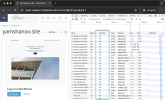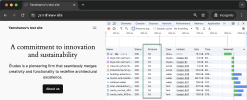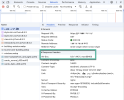-
We value your experience with Plesk during 2025
Plesk strives to perform even better in 2026. To help us improve further, please answer a few questions about your experience with Plesk Obsidian 2025.
Please take this short survey:
https://survey.webpros.com/
You are using an out of date browser. It may not display this or other websites correctly.
You should upgrade or use an alternative browser.
You should upgrade or use an alternative browser.
Dont get why this is not implemented yet?
What are they waiting for? 10.000 Users to vote? This is not very hard to implement. HTTP/2 implementation was super easy in Plesk (clicking a buttom in the Advisor).
Why waiting with every cool feature?
Making a extension out of it to make another 4€/month?
What are they waiting for? 10.000 Users to vote? This is not very hard to implement. HTTP/2 implementation was super easy in Plesk (clicking a buttom in the Advisor).
Why waiting with every cool feature?
Making a extension out of it to make another 4€/month?
Talking about "super easy" about any feature in Plesk is a bit incorrectly. What you think is super easy actually requires a lot of research, difficult implementation, long testing on all supported platforms. The issue of prioritizing features in Plesk is also very complicated. There are many features with a much larger number of votes, but for various reasons, they have not been implemented so far. At the same time, anyone who cannot wait for the desired feature to be implemented by Plesk can write their own Plesk extension and even make money on it. We provide the documentation and all the possibilities for this - Plesk Extensions in a NutshellDont get why this is not implemented yet?
What are they waiting for? 10.000 Users to vote? This is not very hard to implement. HTTP/2 implementation was super easy in Plesk (clicking a buttom in the Advisor).
Why waiting with every cool feature?
Making a extension out of it to make another 4€/month?
All things aside, just because you only see one button in the GUI doesn't mean the the actual implementation of the functionality was "super easy". There's a bit more to these things than just buttons.
I understand the frustration though.
Sorry I overreacted but its just somehow missing a lot of cool featured and instead of telling/signalising "Yeah we wil implement this" they are just waiting for "more Votes"?
If it takes time to implement it takes time, I get this, but if you dont even start it doesnt matter if its done within some seconds or monthes cuz you dont even start.
Same thing as for Debian 10 which probably will not be supported in Plesk Obsidian. But Debian 10 was already released july 2019 and Plesk Obsidian is not released so timing such big released a bit more would be awesome.
Plesk Obsidian is not called Plesk Onyx anymore so many people will expect it also will be based on a more modern base/Server OS. But nope.. Debian 9 its the latest like on Onyx
I wonder why you spread such rumours?Same thing as for Debian 10 which probably will not be supported in Plesk Obsidian.
I wonder why you spread such rumours?
Software Requirements for Plesk (Obsidian)
** - Plesk only supports Debian 8, Debian 9, Ubuntu 16.04, and Ubuntu 18.04 servers running the ‘systemd’ init system. Compatibility with ‘sysvinit’ has not been tested and is not guaranteed.
I know does not belong to the HTTP/3 Topic here but got asked
So what? We constantly release updates with support for new components, OS versions, new features and so on. What makes you think that we will not release support for new versions of operating systems, or new features like HTTP/3? We always did it and will do it. Please be patient and do not spread panic rumours.
Thanks.
LTUser
Regular Pleskian
http/3 should be enjoyed with caution.
The risk that bugs and security gaps will still be found is very high, but if you like to be more hip than sure and rock solid, you are welcome to experiment.
 blog.cloudflare.com
blog.cloudflare.com
The risk that bugs and security gaps will still be found is very high, but if you like to be more hip than sure and rock solid, you are welcome to experiment.
Experiment with HTTP/3 using NGINX and quiche
Just a few weeks ago we announced the availability on our edge network of HTTP/3, the new revision of HTTP intended to improve security and performance on the Internet. Everyone can now enable HTTP/3 on their Cloudflare zone
Eroan
New Pleskian
NGINX still lacks HTTP/3: Our Roadmap for QUIC and HTTP/3 Support in NGINX - NGINX
Aoache, well, doesn't care, We probably won't be seeing stable HTTP/3 support in Plesk any time soon. If you require QUIC/HTTP3, consider using Cloudflare to proxy your content.
Aoache, well, doesn't care, We probably won't be seeing stable HTTP/3 support in Plesk any time soon. If you require QUIC/HTTP3, consider using Cloudflare to proxy your content.
DracoBlue
Basic Pleskian
We are happy to announce that HTTP/3 support is now available in Plesk Obsidian 18.0.61. We suggest you update to Plesk 18.0.61 and check it out.
You can find additional information at (Plesk for Linux) HTTP/3 Support in Plesk.


You can find additional information at (Plesk for Linux) HTTP/3 Support in Plesk.


PeopleInside
Regular Pleskian
I'm sad to see the support of HTTP 3 is not available on my Plesk even if I upgraded to 18.0.61 but as I use Apache and Nigix seems I don't have the option and the possibility to activate HTTP 3 so I must stay on HTTP 2 and is not fully true for me that HTTP 3 is now supported.We are happy to announce that HTTP/3 support is now available in Plesk Obsidian 18.0.61. We suggest you update to Plesk 18.0.61 and check it out.
You can find additional information at (Plesk for Linux) HTTP/3 Support in Plesk.
View attachment 26179
View attachment 26180
I read from the documentation that the support was implemented only for Nigix so just users that use Nigix will benefit from this partial implementation.
Seems this is penalizing Apache users.

PeopleInside
Regular Pleskian
I feel very deluded.
Please read the documentation one more time, it says nothing about User Interface, because the option has not been exposed in UI yet.I'm sad to see the support of HTTP 3 is not available on my Plesk even if I upgraded to 18.0.61 but as I use Apache and Nigix seems I don't have the option and the possibility to activate HTTP 3 so I must stay on HTTP 2 and is not fully true for me that HTTP 3 is now supported.
I read from the documentation that the support was implemented only for Nigix so just users that use Nigix will benefit from this partial implementation.
Seems this is penalizing Apache users.
View attachment 26181
Instead you can use CLI: plesk bin http3_pref --enable
If you use Apache webserver behind Nginx reverse proxy, the support in the frontend Nginx is enough.
If you use nginx as a proxy for apache (or nginx-only option), nginx will able to serve HTTP3 requests.I'm sad to see the support of HTTP 3 is not available on my Plesk even if I upgraded to 18.0.61 but as I use Apache and Nigix seems I don't have the option and the possibility to activate HTTP 3 so I must stay on HTTP 2 and is not fully true for me that HTTP 3 is now supported.
I read from the documentation that the support was implemented only for Nigix so just users that use Nigix will benefit from this partial implementation.
Seems this is penalizing Apache users.
[...]
If you upgrade a server from the previous Plesk version, you need to enable the feature through CLI.
Code:
plesk bin http3_pref --enable -panel -nginxHTTP/3 uses UDP protocol. If you have a firewall (on a server level and/or on the cloud infrastructure level), you need to allow incoming connections to 443/udp, 8443/udp ports.
You can try to check if your server announced the ability to connect to it through HTTP/3 or not,
- with an external tool like HTTP/3 Check,
- with a browser's dev.consone like on the screenshot,

Only if you use apache without nginx in front of it (or IIS in Plesk for Windows), it will not be possible to serve HTTP3 requests.
Currently, as I know, apache does not support HTTP3, 64462 – [Feature Request] Support for HTTP/3.
Similar threads
- Replies
- 8
- Views
- 3K
- Replies
- 4
- Views
- 3K
- Replies
- 2
- Views
- 2K
- Replies
- 4
- Views
- 4K
- Replies
- 4
- Views
- 2K

